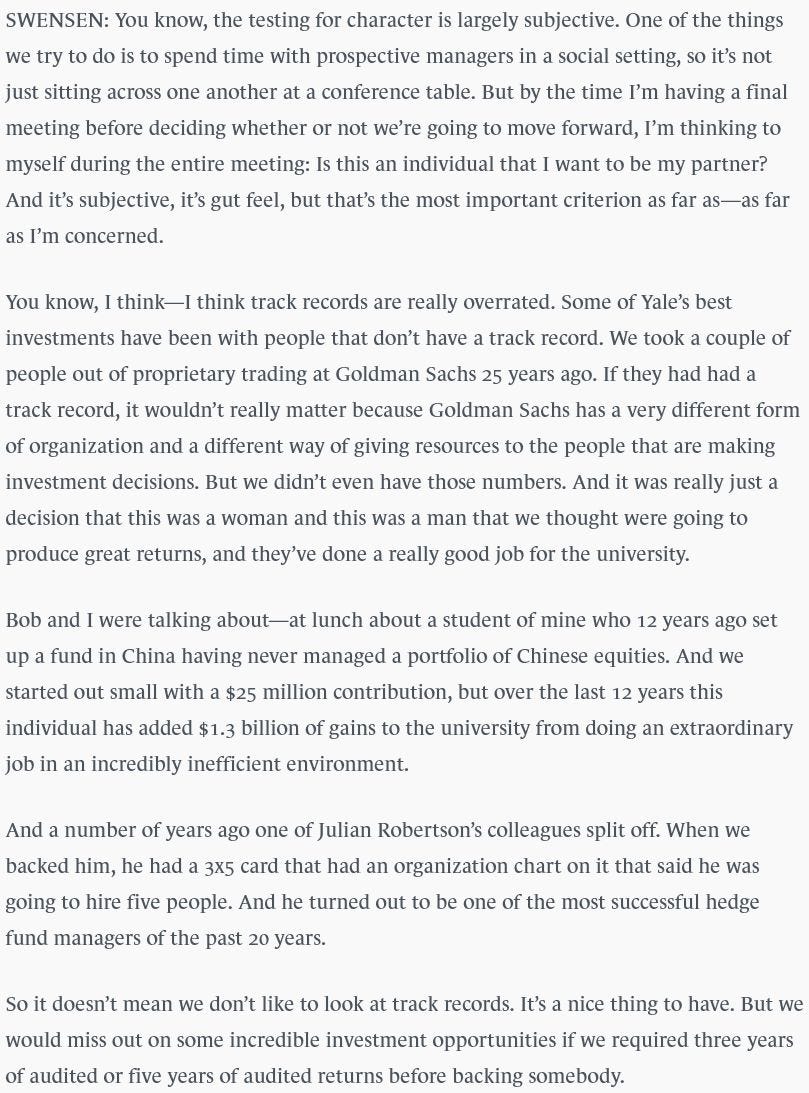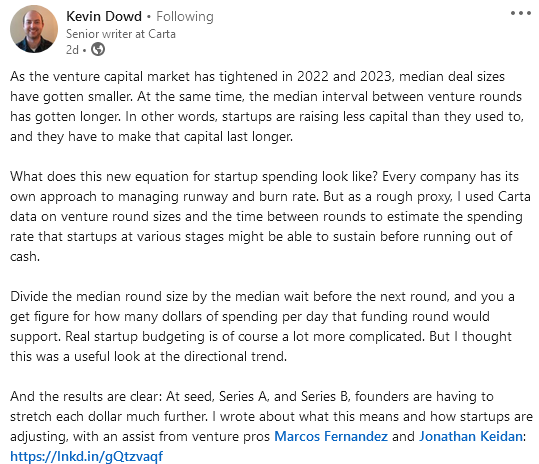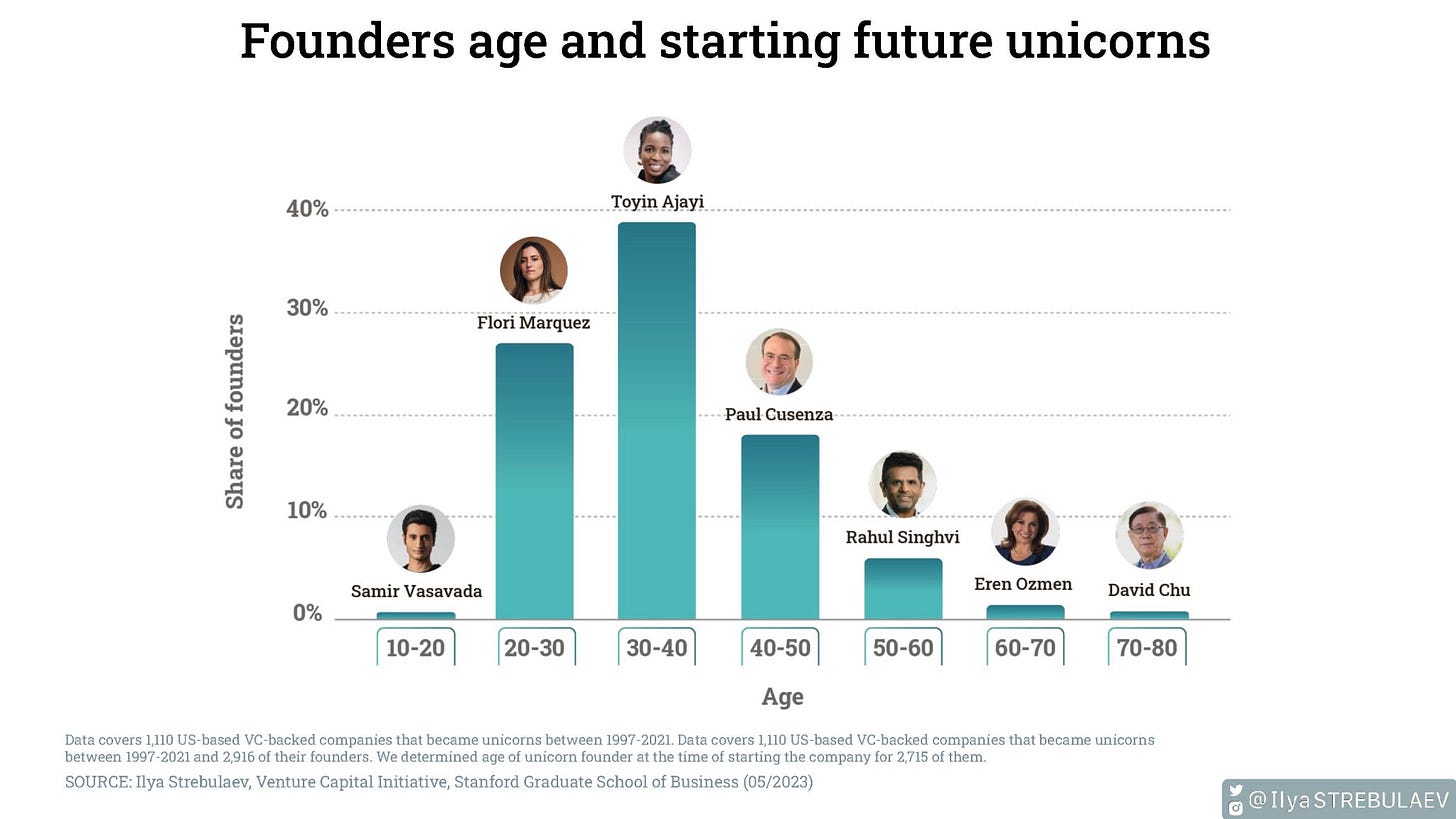Qubit: David Swensen (Yale) on Track Record
At a conference held by the Council on Foreign Relations back in 2017, David Swensen talked about fund managers with no track record:
· Testing for character is largely subjective
· Track records are really overrated
· Some of Yale’s best investments have been people with no track records
One example he shares is the founder of Hillhouse Capital whom the endowment seeded with $25 million twenty years ago. That fund returned $1.3 billion of gains to the University.
“SWENSEN: You know, the testing for character is largely subjective. One of the things we try to do is to spend time with prospective managers in a social setting, so it’s not just sitting across one another at a conference table. But by the time I’m having a final meeting before deciding whether or not we’re going to move forward, I’m thinking to myself during the entire meeting: Is this an individual that I want to be my partner? And it’s subjective, it’s gut feel, but that’s the most important criterion as far as—as far as I’m concerned.
You know, I think—I think track records are really overrated. Some of Yale’s best investments have been with people that don’t have a track record. We took a couple of people out of proprietary trading at Goldman Sachs 25 years ago. If they had had a track record, it wouldn’t really matter because Goldman Sachs has a very different form of organization and a different way of giving resources to the people that are making investment decisions. But we didn’t even have those numbers. And it was really just a decision that this was a woman and this was a man that we thought were going to produce great returns, and they’ve done a really good job for the university.
Bob and I were talking about—at lunch about a student of mine who 12 years ago set up a fund in China having never managed a portfolio of Chinese equities. And we started out small with a $25 million contribution, but over the last 12 years this individual has added $1.3 billion of gains to the university from doing an extraordinary job in an incredibly inefficient environment.
And a number of years ago one of Julian Robertson’s colleagues split off. When we backed him, he had a 3x5 card that had an organization chart on it that said he was going to hire five people. And he turned out to be one of the most successful hedge fund managers of the past 20 years.
So it doesn’t mean we don’t like to look at track records. It’s a nice thing to have. But we would miss out on some incredible investment opportunities if we required three years of audited or five years of audited returns before backing somebody.”
“But Zhang’s time at Yale is now intricately tied to his professional career. Hillhouse Capital — which Zhang founded in 2005 — was named after the street that runs through the heart of Yale’s campus. Three years after Zhang graduated in 2002, Yale became one of Hillhouse Capital’s earliest backers, pooling $20 million when Zhang was first looking for investments.
With just that $20 million, Zhang quickly became an early investor in companies such as Tencent and JD.com — ‘businesses that have shaken up traditional industries across China,’ according to a New York Times profile from 2015.
‘[At Yale,] I learned that investing is not about chasing the shortest path to returns, but about working with the best people to build long-term organizations that really create value,’ Zhang said in an email to the News. ‘If you focus on creating sustainable long-term value, the returns will come.’
According to Zhang, his investment philosophy was largely shaped by his time working at the Yale Investments Office. In 2015, Zhang described his investment strategy as a combination of ‘Swensenism’ — a term inspired by Swensen’s philosophy of ‘unconventional wisdom’— and traditional Chinese Buddhism.
Zhang’s partnership with Yale demonstrates how endowment offices and alumni of universities can benefit from maintaining mutual ties. According to Massachusetts Institute of Technology finance professor Andrew Lo ’81, Swensen is skilled at cultivating close relationships with Yale alumni and members of the Yale Investments Office, identifying skill and mentoring them both within and outside the office.
‘I think it is an advantage because alumni are quite loyal to the University so they have additional motivation for participating in supporting the endowment activity,’ Lo told the News in 2015. ‘We have seen this not only at Yale, but at other universities as well, where if you look at the investment committee of endowments, they are populated with alumni who are talented in the investment industry and are willing to give their services and expertise.’”
Source:
Council on Foreign Relations - A Conversation with David Swensen
Zhang brings finance acumen to the Corporation
Tweets and Posts:
Qubits are insights that we find and share with you.










